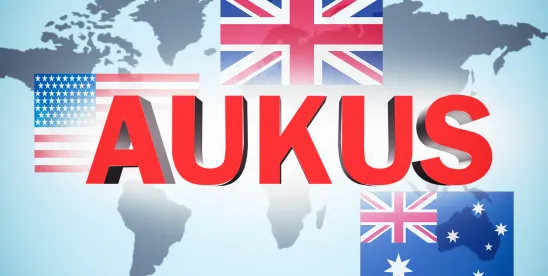As a next step in the U.S. government’s implementation of the trilateral AUKUS security pact with Australia and the United Kingdom (“UK”), the U.S. Department of State’s Directorate of Defense Trade Controls (“DDTC”) and the U.S. Department of Commerce’s Bureau of Industry and Security (“BIS”) recently took measures to further ease export controls among the member countries. Reducing export control restrictions is the linchpin to implementing the AUKUS pact, which aims to bolster security cooperation and defense trade between Australia, the UK, and the United States.
While DDTC stopped short of concretely scaling back export controls under the International Traffic in Arms Regulations (“ITAR”), it proposed a framework to do so in the coming year (likely to turn on Australia and the UK completing the adoption of ITAR-equivalent export controls and exemptions). Meanwhile, BIS lifted a range of controls under the Export Administration Regulations (“EAR”), placing Australia and the UK on nearly equal footing with Canada.
Here are three takeaways regarding these developments:
- DDTC issued a proposed rule to provide broad ITAR exemptions for exports to “authorized users” in Australia and the UK (with comments due May 31).
DDTC’s May 1, 2024, proposed rule would amend the ITAR to exempt from a licensing requirement most exports, re-exports, transfers, and temporary imports of defense articles, provision of defense services, and brokering activities between and among specified “authorized users” in Australia, the UK, and the United States.
The key aspects of the proposed rule are:
- The transfer must take place to or within the physical territory of Australia, the UK, or the United States.
- Participants in Australia and the UK would be limited to specified “authorized users” that undergo an enrollment process and are listed on the DDTC website. U.S. participants must be registered with the DDTC.
- Certain defense articles identified in the Excluded Technology List in Part 126 of the ITAR would be ineligible for the exemption.
- Transactions subject to ITAR congressional notification requirements would be ineligible for the exemption.
- Classified defense articles and defense services are authorized under the exemption provided the relevant authorized users meet their respective industrial security requirements.
- License applications for certain exports of “commercial, advanced-technology defense articles and defense services” to or between Australia, Canada, or the UK would be eligible for expedited consideration.
- DDTC is accepting comments on the proposed rule through May 31, 2024.
- DDTC will only implement the ITAR exemption when the U.S. Department of State (“State”) certifies that Australia and/or the UK have instituted comparable export controls.
Section 1343 of the National Defense Authorization Act for Fiscal Year 2024 requires the President to determine and certify in writing to Congress whether Australia or the UK has (1) implemented a system of export controls comparable to those of the United States, and (2) implemented comparable exemptions from its export controls for the United States. If the President determines that the standard is not met, he must reassess the requirements every 120 days.
State recently declined to make this certification for Australia and the UK, but in an April 19, 2024, press release, noted significant progress along these lines. State went on to explain that “[w]e fully expect to finalize the new trade exemptions—based on stakeholder input—over the course of the next 120 days.”
- BIS relaxed most EAR controls for Australia and the UK, putting them on nearly equal footing with Canada.
On April 19, 2024, BIS issued an Interim Final Rule (“IFR”) amending the EAR to implement AUKUS. The IFR amends the EAR to remove license requirements, expand the availability of license exceptions, and reduce the scope of end-use and end-user-based license requirements for exports, re-exports, and transfers (in-country) to or within Australia and the UK.
The IFR makes the following changes:
- Removal of list-based license requirements for national security column 1 (“NS1”), regional stability column 1 (“RS1”), and missile technology column 1 (“MT1”) for most items, but some items will still require a license, such as firearms and certain satellites and spacecraft. (As a result of these changes, “600 series” items will no longer require a license for export to Australia or the UK.)
- Removal of license requirements for ECCN 0A919 items.
- Removal of military end-use and end-user-based license requirements for exports, re-exports, and transfers (in-country) of certain cameras, systems, or related components.
- Revision of treatment of significant items (“Sis”) (i.e., hot section technology for the development, production, or overhaul of commercial aircraft engines, components, and systems) controlled under ECCN 9E003.a.1 through a.6, a.8, .h, .i, and .l, and related controls, to allow these items to be exported, re-exported, or transferred (in-country) to or within Australia and the UK without a license.
Through June 3, 2024, BIS is accepting comments from the public on “additional revisions to the EAR that would further enhance defense industrial base cooperation and technology innovation with Australia and the UK,” including the possible removal of “EI” controls for encryption items.
Conclusion
The DDTC and BIS measures mark significant milestones on the way to implementation of AUKUS. Easing of ITAR controls, if and when implemented, will be a watershed moment in Australia-UK-U.S. defense trade and will present significant opportunities for exporters. It will be important to monitor developments relating to a possible certification of the Australian and UK export control regimes, as well as possible DDTC revisions to the proposed exemption in response to comments received from the public. As noted above, DDTC’s comment period runs through May 31, 2024.
Dimitri DeChurch-Silva also contributed to this article.





 />i
/>i

